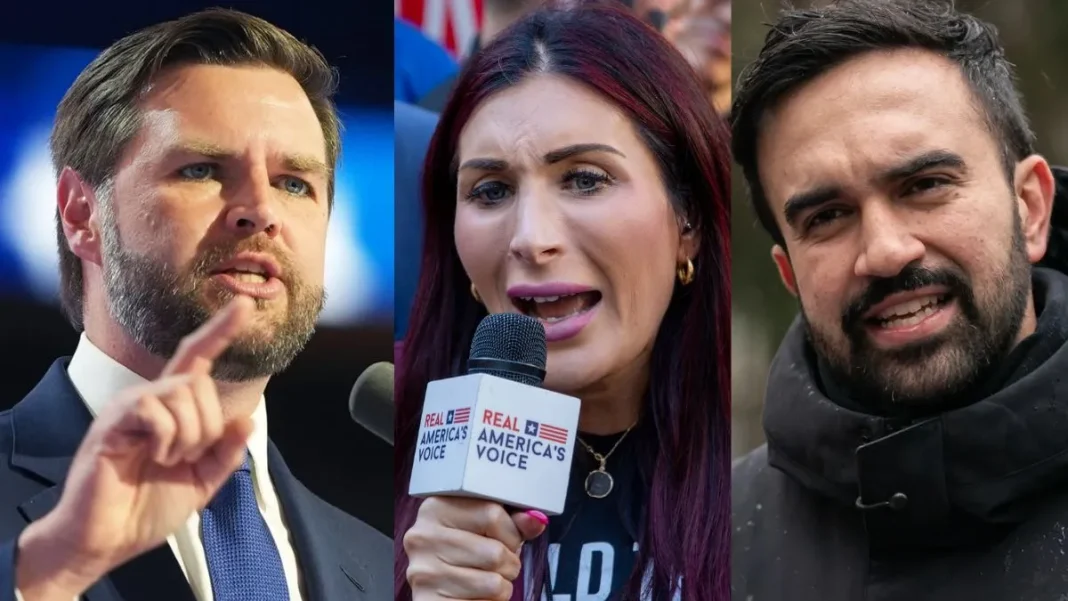A fierce online feud erupted this week between far-right activist Laura Loomer and former Al Jazeera journalist Mehdi Hasan over comments made by U.S. Vice President JD Vance. The controversy began when Vance mocked remarks by New York mayoral candidate Zohran Mamdani, who had spoken emotionally about his Muslim aunt’s experiences of discrimination after the September 11 attacks.
The exchange quickly spiraled into a broader debate on race, religion, and hypocrisy in American politics—drawing in prominent voices from both conservative and liberal camps.
Mehdi Hasan Calls Out JD Vance
It all started when Mehdi Hasan, a British-American journalist known for his sharp political commentary, criticized JD Vance’s mocking response to Mamdani’s story. In a post on X, formerly Twitter, Hasan wrote:
“Imagine being married to a Brown woman and having mixed-race kids and then publicly mocking other Brown people as they talk publicly and emotionally about their experience of racism. Vance is just a bad person.”
Hasan’s remark came after Vance reposted Zohran Mamdani’s video, which showed the Democratic candidate recounting a deeply personal family story. Mamdani’s aunt, he said, stopped taking the New York City subway after the 9/11 attacks because she no longer felt safe wearing her hijab in public.
“She was the real victim of 9/11,” Mamdani had said sarcastically in his speech, pushing back against politicians who, he claimed, used the tragedy to vilify Muslims. The remark was clearly intended to highlight Islamophobia and the fear that gripped Muslim communities in the aftermath of the attacks.
U.S.-Pakistan relations soar as Washington considers transfer of AIM-120D advanced missiles
Vance, however, mocked the statement, replying on X:
“According to Zohran, the real victim of 9/11 was his auntie who got some (allegedly) bad looks.”
That comment was enough to trigger outrage among many journalists and activists, including Hasan, who accused the Vice President of insensitivity toward victims of racism and bigotry.
Zohran Mamdani’s Emotional Recounting of Post-9/11 Islamophobia
Earlier that day, Zohran Mamdani—who has roots in Uganda and India and serves as a New York State Assembly member—delivered an emotional speech outside a Bronx mosque. Surrounded by faith leaders, Mamdani recalled how Muslim New Yorkers were treated with suspicion and hostility after 9/11.
“My aunt stopped taking the subway after 9/11 because she did not feel safe in her hijab,” Mamdani said, choking up as he described the anxiety his family faced in those years. “These are lessons so many Muslim New Yorkers have been taught.”
He spoke about how even members of his family had advised him to hide his faith when entering politics. “An uncle once told me to keep my religion to myself,” he said. “But over these last few days, these lessons have become the closing messages of Andrew Cuomo, Curtis Sliwa, and Eric Adams.”
Mamdani, who is running for mayor of New York City, pledged to “embrace his Muslim identity” more openly in the face of what he described as “racist and baseless” attacks from political opponents. His message resonated deeply with supporters but was soon overshadowed by the Vice President’s mocking post.
Laura Loomer Fires Back at Mehdi Hasan
As the debate over Vance’s remarks intensified, pro-Trump activist Laura Loomer stepped into the fray—defending the Vice President and turning her criticism toward Mehdi Hasan.
U.S.-Pakistan relations soar as Washington considers transfer of AIM-120D advanced missiles
In a pointed response on X, Loomer wrote:
“@JDVance’s wife isn’t a Muslim. If she was, he never would have been Vice President because MAGA isn’t going to ever support a Muslim being in the White House. Do you think Hindus and Muslims are the same?”
Loomer went on to emphasize that Usha Vance, JD Vance’s wife, is a Hindu American. “Usha Vance is an accomplished Hindu American. Our problem isn’t with brown people. It’s with Islam,” she added, tagging both Hasan and Vance in her post.
Her remarks quickly drew backlash, with many users accusing her of promoting Islamophobia and racial division. Supporters of Hasan and Mamdani pointed out that Loomer’s statement explicitly singled out Muslims, while others in the MAGA movement defended her as being “honest” about conservative sentiment toward religion.
This isn’t the first time Loomer has made headlines for inflammatory comments. A former congressional candidate and vocal Trump supporter, she has previously been banned from multiple social media platforms for anti-Muslim statements. Though she was later reinstated after Elon Musk’s takeover of X, Loomer remains one of the most polarizing figures in American right-wing activism.
The Political and Cultural Fallout
The Loomer–Hasan–Vance controversy highlights how deeply racial and religious identity politics continue to divide the U.S. public sphere. Mehdi Hasan, who left MSNBC earlier this year, is widely regarded as one of the most outspoken critics of the Trump movement and its influence on American conservatism. JD Vance, on the other hand, has become a prominent voice for the populist right, rising from his “Hillbilly Elegy” fame to become Vice President under Donald Trump.
Loomer’s intervention turned the online feud into a wider conversation about what “MAGA identity” stands for in 2025. Critics argue that the movement’s leaders, including figures like Vance, have made little effort to distance themselves from Islamophobia, while supporters claim the left unfairly weaponizes race and religion for political gain.
As of Sunday, none of the three central figures—JD Vance, Mehdi Hasan, or Zohran Mamdani—had issued further comments on the dispute. However, the exchange continues to spark heated debate online, illustrating how volatile discussions about faith, ethnicity, and politics remain in the U.S.
For now, what began as a conversation about Islamophobia after 9/11 has morphed into a fresh cultural flashpoint—where America’s political divides over race and religion are once again on full display.
